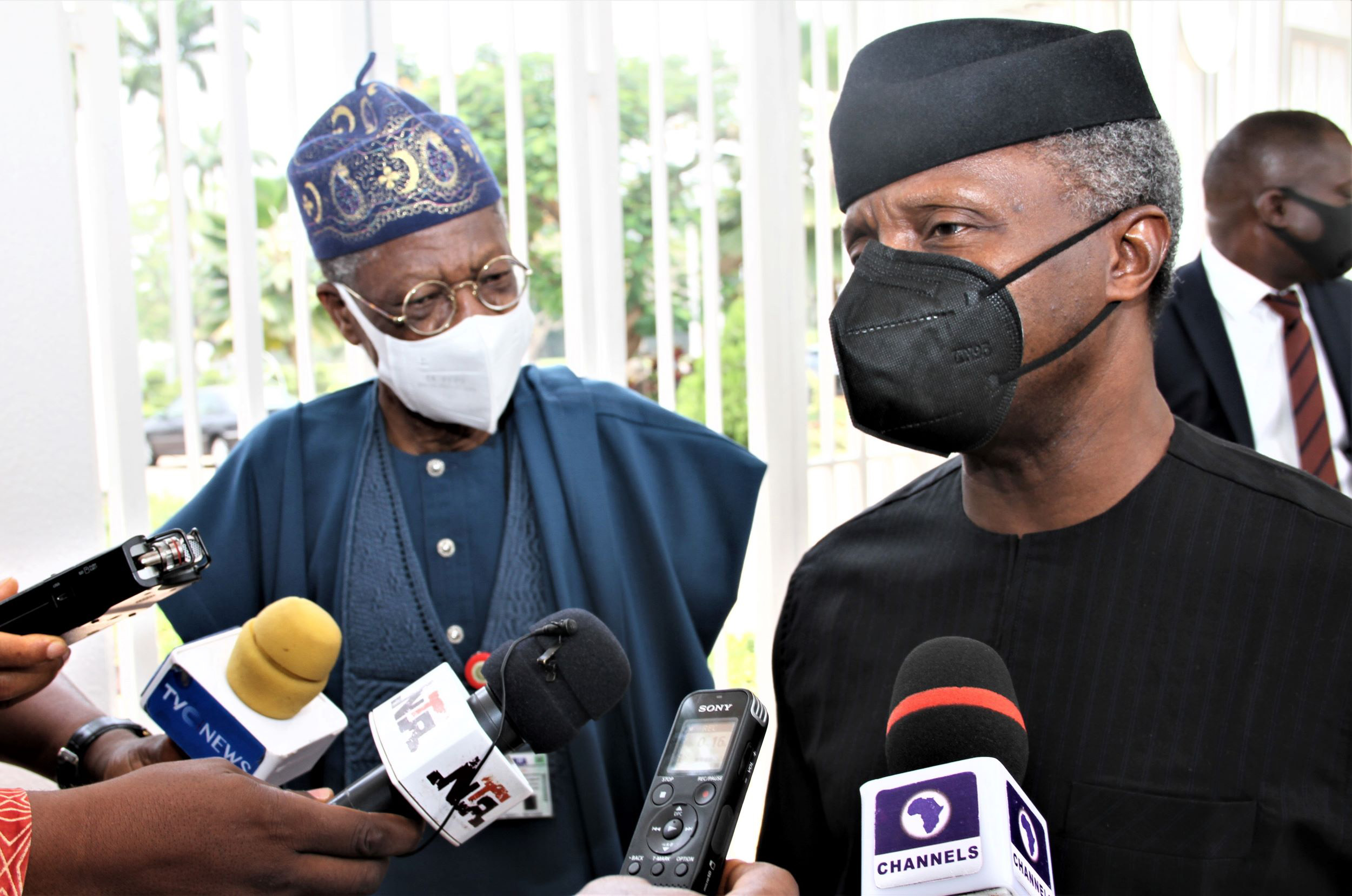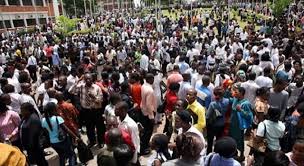Business
Prioritise Agric To Tame Inflation, Experts Urge FG

The Federal Government has been urged to prioritise agriculture in order to tame the country’s rising inflation occasioned by insecurity and hike in electricity tariffs.
Financial experts gave the advice in Lagos, yesterday while reacting to March inflation figure released by the National Bureau of Statistics (NBS), which increased by 18.17 per cent (year-on-year) in March.
The Chief Executive Officer, Sofunix Investment and Communications, Mr Sola Oni, said the rising inflation was not unconnected with the naira devaluation, which was due to external shocks in the international oil market.
“Government should tame inflation through diversification of the economy to optimise production and over dependence on income from crude oil.
“This can be possible by investing in agriculture and creating an enabling environment for the SMEs to thrive and create employment opportunities.
“There should be a deliberate policy of investing in infrastructure among others to ease means of doing business.
“Government should align fiscal and monetary policies to attract investment, encourage economic activities and boost the Gross Domestic Product,” Oni said.
President, Association of Capital Markets Academics of Nigeria, Prof. Uche Uwaeleke, said agriculture should be prioritised with emphasis on mechanised farming for increased output.
Uwaleke said the Central Bank of Nigeria (CBN) should scale up interventions in the agricultural value chain to boost production.
According to him, time has come to take the issue of state police more seriously to tackle insecurity in the country.
He said the Bank of Agriculture should be re-capitalised and partially privatised for it to be more effective.
“The bank was set up to finance agriculture but can’t perform partly due to weak capital base.
“Some of the interventions by the CBN should have been by the BOA if it was well capitalised.
“Private sector participation is required to make it more functional,” he said.
Uwaleke noted that food was the critical component exerting the greatest pressure on inflation.
“This may not be unconnected with insecurity in most parts of the country.
“Another thing to note is that inflationary pressure is more in the urban than in rural areas.
“This could be the consequence of poor transport infrastructure and logistics to convey goods from rural to urban areas resulting in high cost of transport made worse by high fuel price.
“The hike in electricity tariffs equally contributes to rising urban inflation,” Uwaleke said.
Speaking on the implications of the rising inflation, he said the 2021 budget target of 11.95 per cent appeared unrealistic.
“The CBN Governor had said the inflation rate would moderate by May this year.
“This is again unlikely in the face of downside risks from likely hike in pump price of fuel as well as depreciation of the naira,” Uwaleke added.
The NBS disclosed in its report on ‘Consumer Price Index’ for March 2021 that March inflation rate remained the highest in four years.
The consumer price index, which measures inflation increased by 18.17 per cent (year-on-year) in March.
This is 0.82 per cent points higher than the rate recorded in February (17.33 per cent).
The urban inflation rate increased by 18.76 per cent (year-on-year) in March from 17.92 per cent recorded in February 2021, while the rural inflation rate increased by 17.60 per cent in March from 16.77 per cent in February.
Business
NCDMB Recommits To Youths’ Capacity Building

The Executive Secretary, Nigerian Content Development and Monitoring Board (NCDMB), Engr. Felix Omatsola-Ogbe, has reeled out initiatives evolved by the Board in its contribution towards capacity building for youths across the country.
The NCDMB Scribe revealed this recently at the 2024 Practical Nigerian Content (PNC) Youth Forum held in Yenagoa, the Bayelsa State capital.
Tagged “empowering the future: unlocking the opportunities in the Niger Delta oil and gas sector”, the event featured three thematic lecture series delivered by the founder and leader of the Niger Delta Peace Coalition (NDPC), Mr. Zik Gbemre, the Bayelsa State Commissioner for Youths Development, Mr. Alfred Kemepado Nimizigha, and the Chief Executive Officer, PE Energy ltd., Mr Daere Akabo.
Ogbe, who was represented by the Manager, Capacity Building of the Board, Mr. Olugbenga Sheba, noted that the NCDMB has recently partnered the Nigerian Liquified Natural Gas (NLNG) to commence the Nigerian Content Human Capacity Development (NC-HCD) in the oil and gas sector for the training of 331 young graduates.
“As you already know, the NCDMB was established by the Nigerian Oil and Gas Industry Content Development (NOGICD) Act of 2010.
“Our mandate is to develop human capabilities and material capacities in the Nigerian oil and gas industry, and to monitor and enforce compliance with the provisions of the act”, the NCDMB Scribe said.
“The theme for this year’s youth event is ‘Empowering the future: Unlocking the opportunities in the Niger Delta Oil and Gas Sector’. This theme speaks to our determination and ongoing efforts to introduce youths from the Niger Delta to opportunities that abound in the oil and gas industry.
“Few weeks ago, we partnered the NLNG to kick start the Nigerian Content Human Capacity Development (NC-HCD) basic training programme for a total of 331 young graduates. The training covers ICT, Engineering, Welding and Fabrication, Non-destructive Testing (NDT), Lifting and working at Height, Quality Management Systems, Marine and offshore services and Facility Management and Maintenance.
“We also organised training for youths with the Industrial Training Fund (ITF), WalterSmith Petroleum, and other organizations. And as part of the NCDMB’s initiatives in the Niger Delta, we’ve developed two oil and gas parks at Emeyal one in Ogbia Local Government Area of Bayelsa State, and Odukpani in Cross River State”, he added.
By: Ariwera Ibibo-Howells, Yenagoa
Business
FGC, Warri Wins NCDMB, ICPC Maiden Anti-Corruption Schools Debate

The Federal Government College, Warri, Delta State, has won the maiden ‘’Anti-Corruption” debate organised for select Secondary Schools across the six geopolitical zones of the nation by the Nigerian Content Development and Monitoring Board (NCDMB), in partnership with the Independent Corrupt Practices and other related offences Commission (ICPC) at the Content Tower, headquarters of the Board, Yenagoa, Bayelsa State.
The Tide reports that at the debate umpires said following the evaluation from the presentations by the two finalists, Federal Government College, Kazaure, Jigawa State, scored a total of 74.4 points as first runner-up while the Federal Government College, Delta State garnered 76.4 points to emerge winners.
Other schools that participated in the various stages of the debate leading to the finals were Federal Government College, Odi, Bayelsa State; Federal Government College, Okigwe, Imo State; Federal Government College, Ijanikin, Lagos State; Federal Government College, Maiduguri, Borno State; and Federal Government College, Rubochi, Abuja.
The Tide further reports that the theme for the 2024 International Day of Anti-Corruption was, “Effective Whistleblower Protection Mechanism: A Critical Tool in the Fight Against Corruption”, while topic for the debate was, “Impact of integrity on the expansion of public trust and confidence in governance.
Earlier in his keynote address, the Executive Secretary, NCDMB, Engr. Felix Omatsola Ogbe, restated the Board’s stance against corruption, noting that fighting corruption is a must for the Board.
He reaffirmed his commitment to ideas and programmes geared towards putting an end to corruption within the system, and lauded the Federal Ministry of Education for approving the participation of students in the event.
While commending the ICPC for their support and continuous oversight over the activities of the Anti-Corruption Unit (ACTU) of NCDMB, Ogbe also thanked the anti-graft unit of the Board for putting the event together, noting that they were doing well in their efforts at combating corruption.
“To be clear on what today is about, we’re marking and celebrating International Anti-Corruption Day (IACD), with focus on raising the consciousness of our youths on the ills of corruption and how it stunts the socio-economic development of any Nation.
“This is to send a strong message for extra vigilance by all of us in combating the menace of Corruption from all fronts”, the NCDMB boss said.
By: Ariwera Ibibo-Howells, Yenagoa
Business
Free Meter Distribution: FG Deducts N700bn From Federation Account

The Federal Government has earmarked N700billion from the federation account to implement the distribution of free electricity meters under the Presidential Metering Initiative.
This was disclosdd by the Special Adviser to the Minister of Power on Strategic Communications and Media, Bolaji Tunji.
Tunji, who, in a chat with The Tide’s source noted that the PMI was on course with a target to deliver two million meters yearly, also revealed that the amount reserved for the project had reached N700 billion and procurement had started.
“The Presidential Metering Initiative is still on course. Two million meters every year, delivery of the first batch will start by the first quarter of next year. About N700billion provision has been made, and the money is ready”, he said.
He further revealed that the government would fulfil its promise to deliver 1.3million electricity meters out of the 3.2 million meters under the World Bank Distribution Sector Reform Programme initiative this month, saying that “The DISREP programme will commence this month”.
An analysis of the Federal Account Allocation Committee meeting minutes obtained by our correspondent between April and August showed that the government had saved N420billion from a monthly deduction of N100billion.
The amount deducted from the monthly federation revenue before allocation to the three tiers of government was aimed at bridging the metering gap in the country, which currently stands at 50 per cent.
Recall that N120 billion was deducted from April revenue as the first tranche for the PMI, bringing the amount deducted from the federation account for the initiative as of August to N420billion.
In May, the Minister of Power, Adebayo Adelabu, said the government would provide an initial N75billion as seed capital while the Nigerian Sovereign Investment Authority pledged to inject N250 billion annually for the initiative.
The Minister also disclosed that the initiative would leverage debt financing from diverse financial institutions to bolster the PMI’s resources.
The Managing Director of Abuja Distribution Electricity Distribution Company, Mr. Victor Ojelabi, recently said the PMI would unlock about N1trillion in revenue currently tied up in the Nigerian Electricity Supply Industry due to a large number of unmetered customers.
Under the initiative, the Nigerian Electricity Regulatory Commission announced the approval of N21billion for the 11 electricity Distribution Companies to provide meters for end-use customers at zero cost.
The Distribution Sector Recovery Programme is a comprehensive initiative aimed at addressing the challenges and inefficiencies within Nigeria’s electricity distribution sector.
Recently, the NERC acknowledged that the country’s metering gap remains substantial despite installing 3.03million meters since privatising the power sector in 2013.
It said 6.15 million out of 13.33 million registered customers had been metered, bringing the metering rate to 46.14 per cent in 2024.
-

 Editorial3 days ago
Editorial3 days agoAnother Look At Contributory Pension Scheme
-
News3 days ago
Rivers State Flood Committee Inspects Ongoing Desilting Of Major Cannals
-

 Politics3 days ago
Politics3 days agoSenate President Promises Laws To Promote Nigerians’ Health Needs
-

 Niger Delta3 days ago
Niger Delta3 days agoOkpebholo To Revive Moribund Edo Line
-

 News3 days ago
News3 days agoAny Threat To Nigeria’s Security‘ll Be Resisted – Ribadu
-

 Opinion3 days ago
Opinion3 days agoGender Equity And Women Empowerment
-

 News3 days ago
News3 days agoHYPREP Distributes Starter Packs To Trainees
-

 Politics3 days ago
Politics3 days agoAlleged Ugochinyere’s Expulsion, Null, Void, No Effect – PDPNWC

